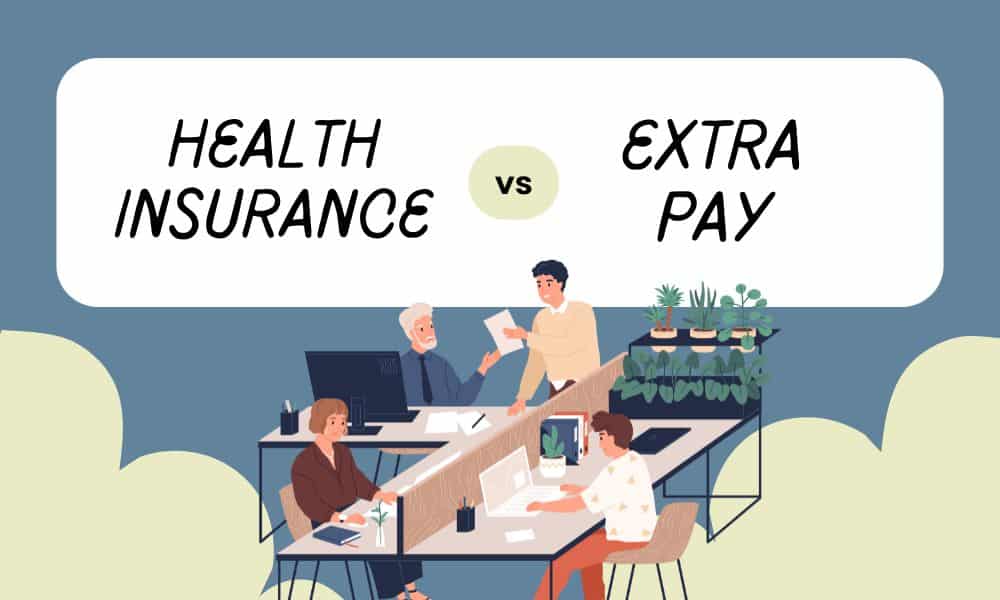In today’s job market, employers and employees alike are weighing different ways to structure compensation packages, particularly regarding benefits. One of the biggest questions is whether extra pay or traditional health insurance makes a better choice for both parties. Health insurance has been a staple benefit in many employment offers, but extra pay, sometimes offered as a financial incentive to forgo health insurance, is becoming more popular.
Let us explore the pros and cons of both options, highlighting how each might fit into a compensation plan. For potential employees, understanding these options can help in making informed decisions that align with their needs.
Understanding the Concepts
Health insurance is a familiar benefit in many workplaces, often provided through group health plans or health reimbursement arrangements (HRAs). These plans cover employee healthcare expenses and often extend to dependents, making them a key factor in employee satisfaction.
In contrast, extra pay, such as a salary increase or opt-out payments, offers immediate financial compensation that can attract employees with existing coverage. For employers, this can reduce the administrative burden associated with maintaining a health insurance plan while allowing employees more flexibility.
The Role of Health Insurance in Employee Compensation
Health insurance has long been a cornerstone of employee benefits, providing peace of mind for medical costs and meeting compliance with the employer mandate for applicable large employers. Offering options like HMOs, PPOs, or HDHPs shows employees a commitment to their wellbeing, often translating into loyalty and reduced turnover.
While health insurance comes with payroll tax benefits and potential tax deductions, it also represents a consistent financial obligation. Still, many employees value the security it brings, especially when facing rising healthcare costs.
Extra Pay as an Alternative to Health Insurance
Offering extra pay in lieu of health insurance can provide flexibility, particularly for small to medium-sized businesses. Financial incentives like higher salaries or opt-out payments can attract candidates who prioritize direct income over healthcare coverage, especially if they’re already covered through a spouse or other means.
By offering extra pay, employers might reduce costs associated with group health plans and gain more predictable financial planning. However, it’s important to consider the tax implications and consult with financial advisors to ensure that these alternatives align with company goals and meet legal requirements.
Comparing the Financial Implications
Examining the financial impact of extra pay versus health insurance is essential for both parties in the employment relationship.
Employee Perspective
Choosing extra pay provides immediate financial benefits, boosting take-home pay and allowing employees to allocate funds as they see fit. However, forgoing health insurance can lead to significant financial risks over time, particularly if healthcare costs arise unexpectedly. Without coverage, employees may face high medical bills, which can strain their finances in the long run.
Employer Perspective
For employers, not offering health insurance can reduce ongoing costs, as health insurance premiums are often a major expense. There are also payroll taxes benefits when structuring extra pay in certain ways, although this approach requires careful attention to regulatory guidelines to avoid issues with compliance. Ensuring that opt-out payments align with Internal Revenue Service regulations and the employer mandate is essential to avoid penalties.
Health Insurance: More Than Just Medical Coverage
Health insurance extends beyond basic medical coverage, offering a range of benefits that can significantly impact employee satisfaction and well-being.
- Covers mental health, dental, vision, and preventative care, which are crucial for comprehensive health.
- Provides protection against catastrophic health costs, reducing the potential for financial hardship due to unexpected expenses.
- Positively influences employee wellness and productivity, as comprehensive health coverage often leads to better health outcomes and lower absenteeism.
Benefits of Extra Pay Over Health Insurance
Offering extra pay instead of health insurance can appeal to employees seeking flexibility and financial autonomy.
- Increases take-home pay, potentially by a significant amount, giving employees more control over their income.
- Allows freedom to allocate money as needed, whether toward savings, debt, or other personal expenses.
- Provides potential investment opportunities with extra pay, enabling employees to grow their finances through investments or retirement contributions.
Risks of Opting for Extra Pay
Choosing extra pay instead of health insurance presents various risks that employers and employees need to consider. For employees, the lack of health insurance means they must shoulder out-of-pocket medical expenses, which can quickly add up, especially in emergencies or for chronic conditions. Without the predictable security of coverage, future healthcare needs become a gamble, leading to potential financial strain if medical costs arise unexpectedly.
For employers, choosing extra pay over health insurance may impact their ability to attract and retain talent. Without health benefits, companies might lose skilled employees to competitors that offer coverage, forcing them to invest more in recruitment and training to replace these valuable team members. Additionally, this approach may raise compliance questions with existing regulations and cast doubt on the company’s commitment to employee welfare.
The Role of Government and Regulation
The government’s role in employee benefits is significant, setting the legal framework that governs what employers can and cannot do regarding health insurance and extra pay. The Affordable Care Act (ACA) mandates that applicable large employers offer minimum essential health insurance coverage to eligible employees, making extra pay an option that requires careful planning for companies to ensure compliance.
The Internal Revenue Service (IRS) also plays a key role in defining how these benefits are taxed. Extra pay is generally considered taxable income, impacting how employees and employers approach compensation packages. Employers must stay informed about IRS guidelines to structure pay options correctly, balancing compliance with flexibility in benefits offerings.
The Psychological Impact of Benefits vs. Pay
The choice between health insurance and extra pay has a psychological effect on how employees feel about their roles. Health insurance provides a sense of security, helping employees feel protected from large healthcare expenses, which can increase job satisfaction and loyalty.
Extra pay, while appealing in the short term, might lack this reassurance, potentially impacting long-term morale. Benefits like health coverage often signal that an employer values their workforce’s well-being, fostering stronger connections, while extra pay offers financial freedom that may boost short-term motivation but lacks that sense of care and security.
Industry-Specific Considerations
Different industries may benefit from unique approaches to extra pay versus health insurance. In sectors with high health risks, such as manufacturing, employees might prioritize health coverage for its protective benefits. Meanwhile, in fields like tech, where younger employees often have their own health coverage, extra pay may be more appealing as it offers flexibility and higher immediate compensation.
Employers should consider their specific industry standards when designing benefits packages to meet their workforce’s needs and expectations.
Flexibility and Hybrid Approaches
Combining partial health insurance with extra pay offers a middle ground for employers seeking flexibility in their benefits packages. This approach can help businesses manage costs while still providing essential health coverage to employees, especially those who may need only basic support. Opt-in or opt-out plans give employees the freedom to choose based on their personal circumstances, allowing them to either take extra pay or secure health insurance coverage, which can be attractive for a diverse workforce with varied needs.
The Global Perspective: How Other Countries Handle This
Internationally, there are diverse approaches to health insurance and extra pay. In Europe, health insurance is often publicly funded, allowing employers to offer higher pay without the need for additional health benefits.
Some countries with public healthcare systems provide both robust health coverage and competitive salaries, creating a unique model that supports employee well-being. Examining these global strategies can offer valuable lessons, showing how different countries balance compensation and healthcare benefits to support both employees and employers effectively.
Employee Retention and Recruiting Implications
Health insurance remains a key factor in attracting talent, particularly in competitive fields where benefits are seen as a significant part of compensation. Offering a comprehensive package that includes health insurance can improve retention, as employees are more likely to stay with companies that invest in their well-being.
Conversely, cash-only offers may risk losing top talent, especially if competitors provide better benefits. Employers aiming to attract and retain skilled workers may need to consider how health insurance impacts their overall appeal in the job market.
Employer Branding and Public Perception
An employer’s choice of compensation packages can significantly shape its brand and public image. Companies that emphasize benefits-heavy packages may be seen as valuing employee welfare, which can appeal to candidates who prioritize stability.
In contrast, organizations that focus on higher pay without traditional benefits may attract those seeking immediate financial gain. Crafting a package that reflects the company’s values can play a crucial role in building a positive reputation, influencing both public perception and employee loyalty.
Financial Planning for Employees: Health Insurance vs. Extra Pay
Employees who receive extra pay instead of health insurance need strategies for managing medical expenses. Health Savings Accounts (HSAs) and private insurance options can provide some financial relief, but they require proactive planning. Without employer-sponsored health benefits, budgeting becomes essential to ensure funds are available for medical needs.
Employers offering extra pay can support employees by educating them on HSAs and budgeting practices, helping them to prepare for healthcare costs and maintain financial stability.
Choosing the Right Path for Your Workforce
In the end, deciding between extra pay and health insurance isn’t a one-size-fits-all choice—it’s about understanding your employees’ needs and finding the right balance that aligns with your company’s values and goals. Health insurance offers long-term security, while extra pay gives immediate financial flexibility.
A tailored approach, perhaps blending both options, could provide the best of both worlds, enhancing employee satisfaction and retention. Take note that a well-crafted compensation package speaks volumes about your commitment to your team. Choose what reflects your company’s dedication to supporting a thriving workforce.




